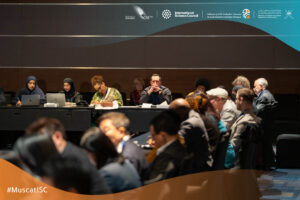
Collaboration without borders: A priority for advancing scientific knowledge
In a world where challenges transcend borders, integrating into international collaboration networks is essential for advancing knowledge and achieving greater impact. This process represents a unique opportunity for non-governmental organizations that primarily operate in local or regional contexts to share their progress, learn from other scientific and cultural approaches, and expand their reach.
One of the most tangible benefits of participating in international collaboration networks is the opportunity to establish long-term partnerships that generate impact in multiple directions. “We are here to promote the use of scientific evidence to support mental health, quality of life, and best practices. This is an extension of that mission, but in a much broader environment,” said Dr. Marizaida Sánchez-Cesáreo, Executive President of Grupo Nexos, following her participation in the Muscat Global Knowledge Dialogue and the Arab Union of Psychological Sciences Leadership Forum, both held in Oman in early February 2025.
Sánchez-Cesáreo, a clinical community psychologist with over two decades of experience in research and public health, attended the event as Treasurer of the International Union of Psychological Science (IUPsyS). Representing more than two million psychologists worldwide, IUPsyS’s presence at the forum is vital for forging new connections and expanding the organization’s global impact.
“It is a space where the most important global issues in science are discussed,” Sánchez-Cesáreo explained, referring to the objectives of the Muscat Global Knowledge Dialogue. Organized by the International Science Council (ISC), this event aims to foster dialogue among scientists from all disciplines to address common challenges from an interdisciplinary perspective.
One of the most relevant topics discussed this year was the impact of artificial intelligence (AI) and the need to integrate social scientists into its development and application. “This whole issue of what’s called ‘machine learning’—or training machines—has implications for human behavior,” Sánchez-Cesáreo noted, emphasizing the importance of involving social scientists in technology projects to ensure more effective and humane solutions.
In addition to sparking discussions on emerging topics, global cooperation forums serve as platforms to highlight the evolution of organizations in attendance. For example, for the first time in its history, IUPsyS is led by representatives from countries in the Southern Hemisphere. “That’s historic,” Sánchez-Cesáreo remarked, noting that this shift has broadened the organization’s agenda, creating a more representative balance between the needs and priorities of developed countries and those facing different economic and social challenges. In her first six months as Treasurer, Sánchez-Cesáreo has met with the seven regions that make up the union (Europe, Africa, Central Asia, Asia-Pacific, the Caribbean, Central America, and the Arab region) to identify their needs and connect those demands with potential funding sources.
Grupo Nexos’ path to internationalization
Beyond her role as an IUPsyS ambassador, Sánchez-Cesáreo’s participation in international cooperation forums aligns with Grupo Nexos’ strategic goal of expanding its impact beyond local borders. “These forums open doors, for example, with foundations sponsoring initiatives worldwide that we could potentially compete for,” she explained, highlighting specific collaboration opportunities. Among them, she noted the interest generated by Grupo Nexos’ mental health assessment tools and the potential to collaborate with professionals in the Middle East on historical trauma.
Collaboration opportunities also include research scholarships for Puerto Rican scientists, joint research projects, and access to international funding managed by the ISC. Additionally, these opportunities provide access to platforms known as focal points that bring together countries from different regions to coordinate efforts and share best practices. In this regard, Grupo Nexos has already begun talks to join the Latin American platform, and a visit to Colombia is scheduled for the summer of 2025.
“This is not just a window—it’s a door that has already opened,” Sánchez-Cesáreo emphasized, underscoring that these connections position Grupo Nexos not only as a recipient but also as an active contributor on the international stage. This integration also positions Puerto Rico as a key player in global knowledge development. “Puerto Rico is on an internationalization path to bring in opportunities. These opportunities are not limited to the pharmaceutical industry or telecommunications and technology companies. Organizations like ours also have something to contribute to that process,” she noted.
Looking ahead, Grupo Nexos’ international agenda includes participating in the Caribbean Regional Conference, attending IUPsyS’ annual meeting in Cyprus, and contributing to the design of the union’s new strategic plan. At the same time, the organization will continue strengthening the collaborations initiated in Oman and exploring new opportunities for Puerto Rican scientists to join international knowledge networks.
As a final reflection, Grupo Nexos’ Executive President emphasized the importance of overcoming cultural barriers and embracing the similarities that connect different regions of the world. “There are more things that unite us than those that separate us,” she said, recalling her experience in Oman—a country whose cultural diversity and scientific legacy left a profound impression. “It was wonderful to see how science developed in Arab cultures and how that legacy has enriched scientific knowledge and the human experience,” she concluded.
Related Posts
Culture of support needed for social workers
The discussion around how to break stigmas and support the well-being of an...
Mental health professionals urge a comprehensive look at the needs of children and youth in Puerto Rico
(Mayagüez, PR) - Adopting a broad human rights perspective on the development...
Dialogue to create joint efforts against juvenile delinquency
The “Puerto Rico Minors Act” (Act 88-1986) was recently reformed. In this...
Functional family therapy for young people in legal trouble
We live in a historic moment for our children and youth, with public policies to...








